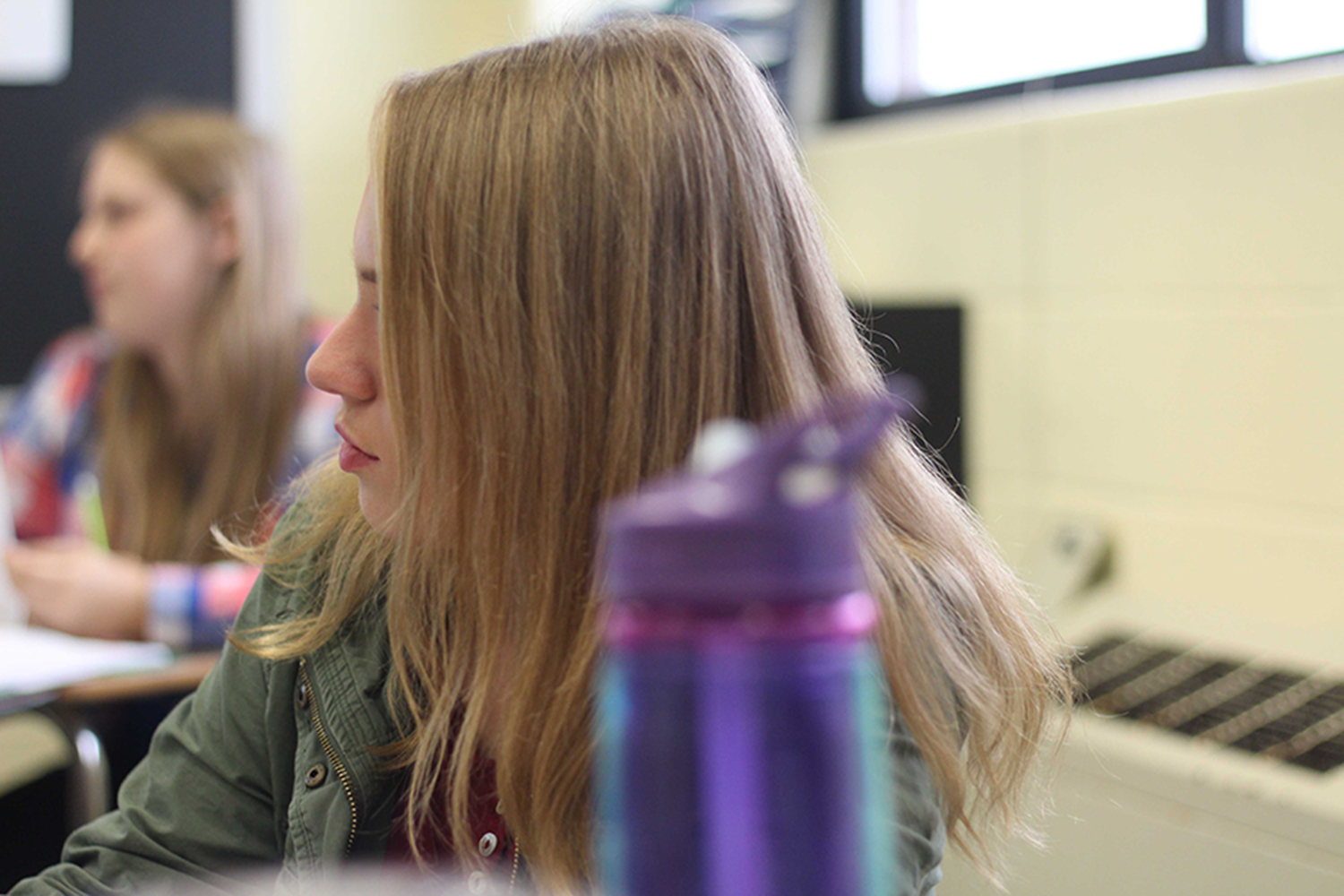Junior Kira Stock Struggles With Narcolepsy
Credit to Savannah Wandzel
Junior Kira Stock does class work in AP Language. The class is taught by Jani Wilkens. They were working on a satire piece by Ed Yeems titled “Live Every Day as if You’re Dying of a Contagious Disease that Turns people You Bite into Zombies.”
Published: April 20, 2017
In junior Kira Stock’s seventh hour, AP Language and Composition, she finds her eyes drooping and her energy fading as the hour goes on. The feeling of exhaustion is constant for her but especially a problem after spending hours focusing on her classes. This is due to the disorder she was diagnosed with as a young child: narcolepsy, a neurological disorder that affects and changes a person’s sleep cycles so that they can only get three to four hours of sleep at a time.
“It’s difficult a lot of times when I want to go do something with friends but I just constantly feel tired,” Kira said. “In the car, I’m asleep as soon as I get in. I’ll fall asleep in the middle of conversations with people, and there’s nothing I can do about it.”
When she was 9 years old, her parents noticed she didn’t act the same as she did earlier in her childhood. She was less energetic and lively, according to her mother, Melinda Stock. They took her to a doctor and she was diagnosed with narcolepsy.
“This is just a theory from the doctors, but they think that she caught a virus in her nervous system,” Melinda said. “Now, the neurons that fire in her brain don’t work the same as someone without narcolepsy. It’s not very easy for her to deal with, especially since we don’t have a definitive cause.”
Even though there is no cure for narcolepsy, people can take stimulants to stay awake for long periods of time. Though the medication helps, it still leaves the recipient feeling fatigued.
“It’s annoying a lot of times,” Kira said. “I used to have so much energy and now I have none and even when I take my medicine, it keeps me awake but I still feel tired. I can do things but I don’t feel fully energized like everyone else does. During marching band season it’s especially hard because after school is over, I’ll have rehearsal then maybe a football game. That’s 15 straight hours of being awake. I have to make sure I’m prepared and that I have access to my medicine to be alert even though I still feel worn-out.”
Because of Kira’s sporadic sleep patterns, her family and friends help out in ways they can, like getting up for school or making sure she gets the notes from an hour she wasn’t fully awake for.
“I’ve been best friends with her since preschool, and when she was diagnosed and even before we knew, I would do my best to help her in school by keeping her from falling asleep,” junior Amanda Denno said.
According to Kira, her grades are very important to her. Kira’s inability to pay attention while doing homework or in class can negatively affect her performance in school. She has to work harder to make sure she gets all her work done and has learned the material.
“It affects her recollection and test-taking,” Melinda said. “When she’s taking the ACT, she does well on the questions that are short, but in things like reading comprehension, if she has one of her brain lapses, she’ll have to start over at the beginning. She has a hard time reading a passage and truly comprehending what it says. We just figured that it was something that was unfortunate, but Kira has so many other talents like being in band, DECA and swimming and she is doing well in school despite this. We just thank God everyday for her and our kids. It is just a bump in the road that you deal with and keep moving on.”







![JV Girls Basketball Takes A Win To FZE On The First Game Of The Season [Photo Gallery]](https://FHNtoday.com/wp-content/uploads/2024/12/voccer10.24_kwallace-3-300x200.jpg)

![It's Time for the BOE to Respect Student Input [Editorial]](https://FHNtoday.com/wp-content/uploads/2024/11/Untitled_Artwork-1-300x173.png)


